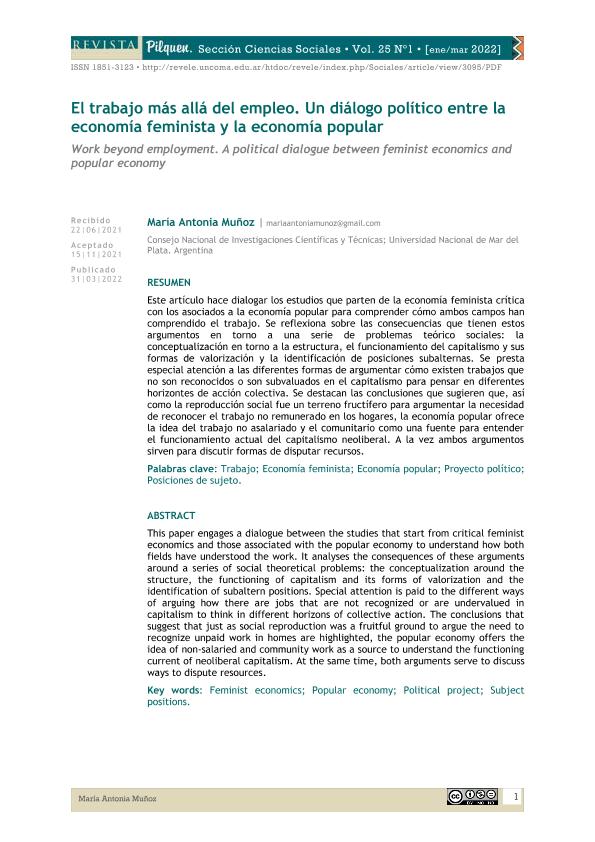Mostrar el registro sencillo del ítem
dc.contributor.author
Muñoz, María Antonia

dc.date.available
2023-10-11T14:53:46Z
dc.date.issued
2022-03
dc.identifier.citation
Muñoz, María Antonia; El trabajo más allá del empleo: Un diálogo político entre la economía feminista y la economía popular; Universidad Nacional del Comahue; Pilquen; 25; 1; 3-2022; 1-23
dc.identifier.issn
1851-3123
dc.identifier.uri
http://hdl.handle.net/11336/214829
dc.description.abstract
Este artículo hace dialogar los estudios que parten de la economía feminista crítica con los asociados a la economía popular para comprender cómo ambos campos han comprendido el trabajo. Se reflexiona sobre las consecuencias que tienen estos argumentos en torno a una serie de problemas teórico sociales: la conceptualización en torno a la estructura, el funcionamiento del capitalismo y sus formas de valorización y la identificación de posiciones subalternas. Se presta especial atención a las diferentes formas de argumentar cómo existen trabajos que no son reconocidos o son subvaluados en el capitalismo para pensar en diferentes horizontes de acción colectiva. Se destacan las conclusiones que sugieren que, así como la reproducción social fue un terreno fructífero para argumentar la necesidad de reconocer el trabajo no remunerado en los hogares, la economía popular ofrece la idea del trabajo no asalariado y el comunitario como una fuente para entender el funcionamiento actual del capitalismo neoliberal. A la vez ambos argumentos sirven para discutir formas de disputar recursos.
dc.description.abstract
This paper engages a dialogue between the studies that start from critical feminist economics and those associated with the popular economy to understand how both fields have understood the work. It analyses the consequences of these arguments around a series of social theoretical problems: the conceptualization around the structure, the functioning of capitalism and its forms of valorization and the identification of subaltern positions. Special attention is paid to the different ways of arguing how there are jobs that are not recognized or are undervalued in capitalism to think in different horizons of collective action. The conclusions that suggest that just as social reproduction was a fruitful ground to argue the need to recognize unpaid work in homes are highlighted, the popular economy offers the idea of non-salaried and community work as a source to understand the functioning current of neoliberal capitalism. At the same time, both arguments serve to discuss ways to dispute resources.
dc.format
application/pdf
dc.language.iso
spa
dc.publisher
Universidad Nacional del Comahue
dc.rights
info:eu-repo/semantics/openAccess
dc.rights.uri
https://creativecommons.org/licenses/by-nc-sa/2.5/ar/
dc.subject
TRABAJO
dc.subject
ECONOMIA FEMINISTA
dc.subject
ECONOMIA POPULAR
dc.subject
SUJETOS POLITICOS
dc.subject.classification
Sociología

dc.subject.classification
Sociología

dc.subject.classification
CIENCIAS SOCIALES

dc.title
El trabajo más allá del empleo: Un diálogo político entre la economía feminista y la economía popular
dc.title
Work beyond employment: A political dialogue between feminist economics and popular economy
dc.type
info:eu-repo/semantics/article
dc.type
info:ar-repo/semantics/artículo
dc.type
info:eu-repo/semantics/publishedVersion
dc.date.updated
2023-10-10T13:08:16Z
dc.journal.volume
25
dc.journal.number
1
dc.journal.pagination
1-23
dc.journal.pais
Argentina

dc.description.fil
Fil: Muñoz, María Antonia. Consejo Nacional de Investigaciones Científicas y Técnicas. Centro Científico Tecnológico Conicet - Mar del Plata; Argentina. Universidad Nacional de Mar del Plata; Argentina
dc.journal.title
Pilquen
dc.relation.alternativeid
info:eu-repo/semantics/altIdentifier/url/https://revele.uncoma.edu.ar/index.php/Sociales/article/view/3847
Archivos asociados
